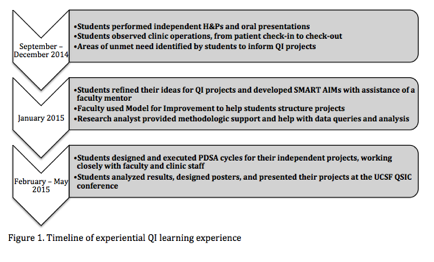Session Information
Date: Tuesday, November 10, 2015
Title: Education Poster II
Session Type: ACR Poster Session C
Session Time: 9:00AM-11:00AM
Background/Purpose:
The UCSF Action Research Program is a course in Implementation Science started
in 2012 for first and second year medical students that has created a platform
for faculty to engage with UCSF medical students around critical issues in
health care quality and safety. The primary goal of this program is to create a
novel experiential learning program integrating a traditional preceptorship with education about health care quality and
safety for first year medical students.
Methods:
Four UCSF first year medical students were chosen to participate in a year-long experiential learning curriculum in the San
Francisco General Hospital (SFGH) rheumatology clinic, under the leadership of two
rheumatology faculty members, one rheumatology fellow, and one research analyst.
The students attended weekly clinic sessions from September 2014 through June
2015. Faculty provided pre-clinic didactics on quality improvement (QI) or
clinical medicine. The students participated in the team huddle at the start of
clinic and then focused each week on learning clinical skills or working on
their QI project. Faculty saw patients with the students and assisted with QI
projects as needed during the clinic session and outside of clinic.
Results:
All four of the students completed an individual QI project under the
leadership of a faculty mentor and presented their projects at the annual UCSF Quality
and Safety Innovations Conference. Projects focused on improving no-show
rates, integrating the FRAX tool into the electronic medical record, and
creating a health coaching intervention to improve patient-clinician
communication and high-risk medication knowledge. Students were well integrated
into the clinic and worked collaboratively in interprofessional
teams to implement their projects.
The primary challenge was the significant time commitment required of
faculty members to create a high-quality experience for the students in
addition to providing patient care. Student feedback has been overwhelmingly
positive, with all four reporting this as one of the highlights of their
medical school experience thus far.
Conclusion:
We created a novel experiential learning program for first year medical
students that integrated a traditional clinical preceptorship
with education about health care quality and safety in a rheumatology safety
net clinic. Students added value to the clinic and made strides in improving
quality in multiple domains. Students and faculty reported high levels of
satisfaction with the experience. The primary challenge is to address the need
for significant faculty time commitment to ensure a sustainable program that
can be carried out in other settings.
To cite this abstract in AMA style:
Goglin S, Margaretten M, Trupin L, Yazdany J. New Frontiers: Teaching Quality Improvement to First Year Medical Students in a Rheumatology Safety Net Clinic [abstract]. Arthritis Rheumatol. 2015; 67 (suppl 10). https://acrabstracts.org/abstract/new-frontiers-teaching-quality-improvement-to-first-year-medical-students-in-a-rheumatology-safety-net-clinic/. Accessed .« Back to 2015 ACR/ARHP Annual Meeting
ACR Meeting Abstracts - https://acrabstracts.org/abstract/new-frontiers-teaching-quality-improvement-to-first-year-medical-students-in-a-rheumatology-safety-net-clinic/

